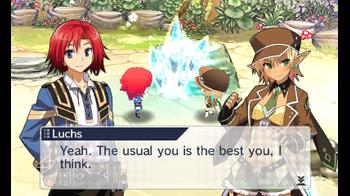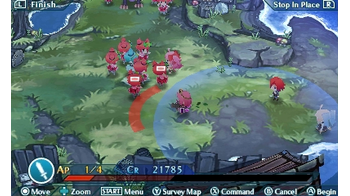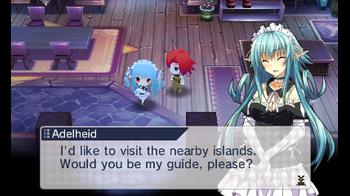
Lord of Magna: Maiden Heaven Review
From the outset, Lord of Magna: Maiden Heaven carries an interesting premise that is filled with interesting ideas. It is a tactical RPG that bears some dating sim elements with choices that matter to an extent. Players are encouraged to play through the game multiple times if they want to see everything the game has to offer. Even though the game has several refreshing components, Lord of Magna presents an intriguing case in which design philosophy clashes with execution.
Upon initiating a new game, players take the role of Luchs Eduard, a young innkeeper, managing the Famille Inn. Both Eduard's first name and the inn's name can be changed for a more personal or wacky experience. He and his best friend, Bart, are in the business of trading crystals with the former retrieving these valued minerals and the latter selling them off.
The game shakes things up as a big earthquake hits the area, which means profit is to be had inside nearby caves. Little did Luchs know that this typical trip to gather crystals would be a life-changing one; he finds a mysterious girl trapped inside a crystal - holding a bracelet. As Luchs inches his way to this bizarre scene, vicious monsters surround him. Ready to give up his life, the bracelet responds his earnest wish to live as the girl awakens from her crystal prison and annihilates the fiends in one swing of her deadly blade.
Thus, Lord of Magna begins its central storyline to find the other faerie sisters of the enigmatic Charlotte. With no memory of her existence, Luchs must piece together who she is, where her siblings are, and why they can't remember who they are.
Putting story at the forefront, this RPG shines at engaging players with its central cast. Each of the sisters have a distinctive personality that mesh well together to construct a fun, jubilant atmosphere. Character interaction is one of the game's strongest aspects as more beautiful girls make the Famille Inn their home. From the level-headed Beatrix to the socially awkward Diana, the faeries have a lot to love about them and it's up to each player to decide who they'll spend time with.
Unfortunately, Lord of Magna runs into a nasty pacing issue at the latter half of the game. A handful of the sisters are introduced a tad too late to be fully fleshed out like their earlier siblings. There's a noticeable decrease in slice-of-life events between the whole cast as more and more sisters join in compared to earlier parts of the game. The overall plotline in Lord of Magna is not outstanding, but certainly enjoyable. It feels a bit rushed once the majority of the faeries have been met.
Presentation is one of the strongest key factors in Lord of Magna; it simply oozes style. The 3D models forming the expressive chibi-look of the characters are adorable to look at and their animations grant them a sense of life. These big-headed models hardly stay still during cutscenes and are usually swaying in different ways to convey impatience, disappointment, and other body language cues to reinforce the mood. Additionally, the way the anime-styled portraits move during conversations are quite gorgeous. The frame-by-frame work in breathing life to the characters through the dialogue interactions with them is quite admirable. It's the little things that add up to make this a joy to play.
Vibrant environments further enhance the experience on the presentation side of things. Whether it's a Newton's cradle inside Luchs's room continually showcasing force in action or hung laundry carrying forth the wind's slight breeze, a variety of lush environments are present in Lord of Magna. Personality isn't confined to just the characters, but also to its surroundings. The overall look of the game is no small feat and while there is a variety of outdoor environments, the amount of indoor scenery is lacking.
Players will often visit most of these environments again and again in battles, whether it's tied to the story or simply in a Free Battle. Lord of Magna possesses an interesting take on traditional battle systems by borrowing elements of strategy RPGs and concocting a strategically sound battle mechanic revolving around positioning.
Based on a predetermined turn order, characters start off their turn inside a circle radius in which they're free to move around in. The size of the circles depend on a character's stats and can be further enhanced with items and/or skills. Plus, each character has an effective attack range that is tied to the weapon they wield. Charlotte's blade covers a wide arc in front of her while Elfriede's rifle covers a much slender curve of ground a few spaces away from her. Players can choose to expend 1 AP (action point) to execute a basic attack, use an item, guard to reduce incoming damage, or do nothing to save AP to execute more powerful abilities that consume multiple AP.
The grand sum of these mechanics lie within how enemies are organized in Lord of Magna. Enemies come in the form of small battalions; disposable enemy grunts are led by a central commander. Even though grunts have 1 HP, commanders can summon more once a few are extinguished. Therefore, players must eliminate these leaders as soon as possible to prevent more reinforcements from being summoned. Furthermore, several in-stage obstacles such as logs or bombs, can help open up new routes to reach enemies faster.
There is a certain trick to all this that makes for wonderfully tactical battles. Whenever a character hits one or more enemies with their weapon, they fly back and any enemies they hit will send those enemy units flying back to do damage. Chain 10 or more of these grunts together in a single attack and a character will be granted an extra action in their same turn. At its core, Lord of Magna encourages this quirky "bowling" mechanic to vanquish foes effectively.
On top of all this, elemental affinities also play a significant role in Lord of Magna's brawls. Each faerie is tied to either Heaven, Flame, Frost, or Earth while Luchs bears a Void element allowing him to wield skills of any element on top of exclusive, mostly supportive, Void skills. The four affinities that the girls are assigned are more effective against others while being weak to specific ones. Heaven, for instance, does bonus damage to Flame and Frost enemies, but is weak to Earth. Choosing which of your lovely faeries to participate in combat to maximize damage leads to slightly quicker battles. Crafting or buying Skill Chips expands the array of abilities a maiden can use as long as she has enough memory slots to equip all of them.
Battles do become tediously repetitive though. As players progress through the game, the flow of combat hardly changes up. The lack of variety in objectives, outside of very few instances of saving an NPC before their HP runs out, makes each fight scenario feel the same. Destroying all enemies and/or taking out all the enemy generators that spawn new enemies after a certain amount of turns quickly becomes tiresome. Matters take a turn for the worse when enemy HP starts to get inflated to the point that killing them takes a lot of turns all while an enemy generator at the other side of the map is ready to spew out even more of them. Altering the difficulty, via the options menu outside of combat, does help rectify this issue to some extent.
Throughout Lord of Magna, event progression is tied to either advancing the story or initiating a HEART Event with one of the girls, which I'll get into later. In the meantime, players have a handful of things they can choose to do. Free Battles allow players to engage in battles without advancing the game so it's a resourceful way to grind levels and gather more crystals to buy items. Several features are also available when wandering around the Inn hub area, including using different bathing salts to activate a buff for an upcoming battle and trading specific items with characters to potentially receive a more valuable reward.
On trading, it's important to note that players will have to speak with a character multiple times for this option to appear and there's no indicator of which characters are available to trade with at any given time. It's a bit of a shame that the Inn is the only hub area for the bulk of the game. The nearby town can't be explored and only shows up during event scenes. All the other environments are there for battles and nothing more. It feels disappointingly limited in scope.
Lord of Magna's dating sim component comes in the form of three HEART Events per faerie. At certain times throughout the game, players are given the choice to spend time with one of the girls to advance Luchs's relationship with them. These events are all context-sensitive and exclusive to that point in the game.
To clarify, let me give a sample scenario. After a story battle, there are heart icons above the level-headed Adelheid and energetic Gabriele. Let's say that the player already has a HEART I event done with Gabriele and none for Adelheid. Speaking to Adelheid will execute a mini character arc event that results in Luchs and her getting closer which unlocks Adelheid's new ability, but this ability is Adelheid's HEART II skill. That's because the player chose to spend time with Gabriele at an earlier time, therefore unlocking Gabriele's HEART I skill, over Adelheid and is now completely locked out of seeing the HEART I events for Adelheid along with that specific skill until the next playthrough. All of the special skills associated with HEART levels are tied to the Tension gauge, which builds "magna" in combat to use them. Magna rises faster in proportion to how many enemies were chained or hit with a single attack or skill.
Choices matter in this game and though not mandatory, players should take note that they should stick to with one or two girls with HEART event opportunities that don't overlap with each other if they want to see all the character development Lord of Magna has to offer for one of the sisters. Plus, there are multiple variations of the base ending, one for each maiden, that is directly tied to how many HEART Events a player has completed for each girl. In the event that several sisters are tied with one another in HEART Events by the end of the game, the player can choose which ending he or she wants to view.
The sound design in this game is a mixed bag. A wide array of melodic tunes accompany scenes and skirmishes; it especially stands out in the more story-related battles nearing the end while standard theme at the Inn assists players in relaxing from a difficult fight. On the other hand, the inconsistent state of which lines are fully voiced, partially voiced, and not voiced at all somewhat ruins the impact of many scenes. I'm aware that this was the case in the original Japanese version of the game as well, but it's still off-putting to hear. Sometimes the line being voiced isn't matched up with what the character says at all in the dialogue box. What starts off as a minor nuisance slowly builds up and sometimes affects the mood of certain scenes negatively.
Although I didn't have a chance to try it out for myself, there is a StreetPass feature in Lord of Magna as well. It transports the player to Sugar's field and supposedly, "mystery plants" will grow with each StreetPass that can be harvested to get some items. A minor component, but one worth mentioning for players who StreetPass heavily - know that there are rewards that await you!
The biggest shortcoming of the game comes with how the game encourages multiple playthroughs along with the repetitiveness of grinding crystals in order to purchase high-end Skill Chips. The prices in the shop, especially for more powerful Skill Chips, are absolutely absurd with any one of them taking up more than 60% of a player's overall funds given that they haven't been grinding Free Battles nonstop. If players want to see everything a faerie has to offer in combat, be prepared to spend a lot of hours racking up crystals to buy and/or craft expensive Skill Chips along with making sure not to miss a HEART event tied to her.
Lord of Magna: Maiden Heaven is an enjoyable RPG experience that will run players approximately 15-20 hours on their first playthrough. Subsequent playthroughs are naturally much shorter with the option to fast-foward scenes. A New Game+ system lets players transfer the levels of two characters, five items, all of a player's money, and all HEART Event progression. There are a lot of interesting ideas packed into this small game, but it felt restrictive and left me wanting more out of it. The more it showed off of what it could have delved into, it was all but over already.


